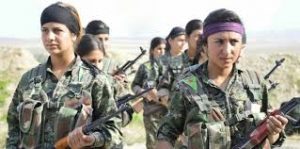Kurdish leaders have called for a “general mobilization” along the border with Turkey after Ankara said it was about to launch an offensive into northern Syria following the pullout of U.S. forces from the area, ike reported by rferl.org.
The Kurdish-led civilian administration in northeastern Syria warned on October 9 of a “humanitarian catastrophe” in northern Syria if hostilities break out, while Russian Foreign Minister Sergey Lavrov warned that U.S. actions in the area could “ignite the whole region.”
“We call upon our people, of all ethnic groups, to move toward areas close to the border with Turkey to carry out acts of resistance during this sensitive historical time,” the local authority, known as the Autonomous Administration of North and East Syria, said.
Reports late on October 8 said the Turkish Army had boosted its positions on the border with Syria, with dozens of military trucks, armored personnel carriers, and tanks seen heading to the town of Akcakale.
Meanwhile, Turkish officials said that the military struck the Syrian-Iraqi border to prevent Kurdish forces using the route to reinforce its units in the region.
The SDF said Turkish forces were shelling one of their positions in the border town of Ras al-Ain — one of the places from which U.S. troops withdrew earlier this week, according to a British-based group monitoring the war.
In a column published in the Washington Post, Turkey’s President Tayyip Erdogan’s communications director said Turkish forces, together with the rebel Free Syrian Army, will cross the Syrian border “shortly.”
Fahrettin Altun wrote that Kurdish militants in the area could either “defect” or Turkey will “have no choice but to stop them from disrupting” its fight against the Islamic State (IS) extremist group.
Ankara says it intends to create a 30-kilometer-deep “safety zone” along its border with Syria to resettle up to 2 million of the more than 3.6 million Syrian refugees living in Turkey.
About 400,000 people have been killed in Syria’s civil war, which has raged since 2011.
Turkey regards the Kurdish militias, which dominate the U.S.-allied Syrian Democratic Forces (SDF), as “terrorists.”
Kurdish forces who helped defeat IS fighters in the war-torn country have described the U.S. pullout from northeastern Syria as a “stab in the back.”
Defending his move, U.S. President Donald Trump said the withdrawal affected “only 50 soldiers,” while the Pentagon said the U.S. personnel were removed “to ensure their safety” but that they were not being sent out of Syria.
“We may be in the process of leaving Syria, but in no way have we abandoned the Kurds, who are special people and wonderful fighters,” Trump said, adding: that Washington was helping Kurdish fighters “financially [and with] weapons.”
Lavrov, however, took issue with the U.S. withdrawal, saying during a press conference in Kazakhstan’s capital, Nur-Sultan, that the Kurds were “extremely alarmed” and that a broader conflict “must be avoided at all costs.”
Describing ties between Washington and Ankara as “very good,” the U.S. president said that “any unforced or unnecessary fighting by Turkey will be devastating to their economy and to their very fragile currency.”
Trump also said Erdogan will visit the White House on November 13.



